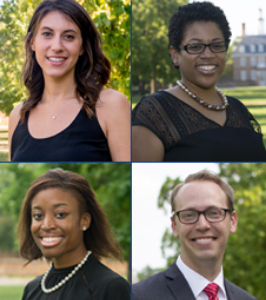BJC Fellows Featured Prominently at Annual BYU Religious Freedom Conference

The Annual Religious Freedom Review at Brigham Young University offers the opportunity for important dialogue across religious and cultural divides about current issues related to religious liberty. As BJC General Counsel Holly Hollman, who was a featured speaker at last year’s conference, explained in a video preview, the conference is “a great effort to try to bring people together to have sometimes difficult conversations…”
This year’s theme was “Religious Freedom for a New Generation,” and BJC voices were prominent in that conversation. Four BJC Fellows were among the conference presenters: Tanner Bean, Jaimie Crumley, Sabrina Dent, and Sofi Hersher.
Dr. Dent moderated a panel on Religion and Racial Reconciliation. About her contribution, she tweeted:
In honoring my ancestors, I opened a panel discussion @iclrsorg‘s #rfreview by reminding attendees we cannot forget the long-term implications of #religiousfreedom w/o considering human freedom. This is a part of the healing work of religious & racial reconciliation. #Juneteenth
BJC Fellow Sofi Hersher added that Dr. Dent led the panel “into an important discussion on what it actually means to reconcile across lines of race and difference in systemic (and thus more robust & meaningful) ways.”
The keynote address for the Conference, given by Patrick Kearon, of the Church of Jesus Christ of Latter-Day Saints, included poignant reflections on the need to actively maintain our religious freedom birthright by defending religious liberty for all. As reported by the Salt Lake Tribune:
“Religious freedom means nothing if you protect your own religious practice while neglecting the practice of others, especially those who might be less secure and able to defend themselves…. It only works if you protect the rights of everyone.”
Defending and respecting others does not mean that adherents must diminish their own beliefs, said Kearon. Rather, a broad view of religious liberty frames it as something universal and inalienable for all people.
…
“Most of us drink from the waters of religious freedom without even knowing it,” Kearon said. “We think of it as a river that will always flow, but we might not recognize the rifts and tributaries that feed that river.”
“Although people who have religious freedom might not think about it on a daily basis, those who lack it are forced to grapple with it constantly…. Though these inalienable rights come from above, they still must be cultivated by human beings down below.”
For more information on the incredible BJC Fellows program, see this resource page.




